Photographs: Courtesy, Reva Electric Car Co. Byravee Iyer
At 7, Race Course Road, the residence of Prime Minister Manmohan Singh, you can find a glittering array of cars. They are all fitted with post-modern gizmos and security gadgets, and their armour is thick as a tank's.
There is also a small electric car which is used to carry passengers, one at a time, from the high-security gates to the house. It rubs in a subtle message to visitors from abroad:
The Prime Minister's office is environment-friendly, and India can make an electric car on its own. The Reva has a place of pride in the fleet.
This car will cost you just 4 paisa per km!
Image: Chetan Maini, vice-chairman and chief technology officer, Reva.Photographs: Courtesy: Reva website.
Cut to the Australian outback 20 years ago. Chetan Maini, a student at the University of Michigan, races the solar-powered car he has built from scratch, against venerated names like Honda.
At the end of the long drive, Maini comes third. More than that, it makes Maini, 19, think seriously about electric vehicles. He first takes a Master's in mechanical engineering from Stanford University, with a focus on hybrid electric vehicles, and then in 1994 sets up Reva Electric Car Company in Bangalore, India's hi-tech capital, in collaboration with California-based AEV LLC.
He names the company after his mother. Over the next seven years, Maini and his men research electric cars, register five patents and try to develop insights into the consumer's mind.
In 2001, Maini launches his first car - a two-seater that can touch speeds of up to 60 km per hour and run 80 km on a single charge - under the brand Reva in India and G-Wiz in London. Since then, Maini has put the car through two upgrades: The Reva-i with lead acid battery in January 2008 and the Reva L-ion with high-performance lithium ion battery exactly a year later.
He has sold 3,400 Revas so far - 1,700 in India, including the one to the Prime Minister's office, and an equal number abroad. These cars have together logged 70 million kilometers, Maini, the vice-chairman and chief technology officer of Reva Electric Car Company, says with quiet pride.
This car will cost you just 4 paisa per km!
Image: The Reva, painted by artists.Photographs: Courtesy: Reva website.
Electric cars, given the new-found environmental consciousness of governments and consumers across the world, are the flavour of the season. Countries like the UK and even China have offered subsidies for electric cars to cut down carbon emissions and reduce dependence on fossil fuels.
Automakers are falling over each other to have hybrids, which run on fossil fuels as well as battery, and electric cars in their portfolio. Thus, automakers will introduce 42 electric models by 2012, says a recent study by PricewaterhouseCoopers.
Electric cars will be 2 per cent of the global market by 2020, Volkswagen has predicted, while Nissan's Carlos Ghosn has put the figure at 10 per cent. Clearly, Maini has the first mover's advantage in a market that will only go north in the days to come.
This car will cost you just 4 paisa per km!
Image: Reva car.Photographs: Courtesy, Reva Electric Car Co.
But the ride so far hasn't been smooth. In the days before the launch, Maini had counted on a subsidy of Rs 100,000 by the government on each car. This was supposed to bring down the ownership cost. However, when the car eventually launched, the government yanked the subsidy off.
This threw Maini's plans off gear, and as a result, the two-seat car's cost came to as much as a Maruti 800. On top of it, there weren't enough recharge booths in the country. The looks were not worth writing home about, and there wasn't any thrill in the speed.
The lack of an air-conditioner was a huge negative in the North. Little surprise then, Reva Electric Car Company hasn't managed to break even yet. But Maini is confident things could change for the better in the days to come. He has his strategy ready.
This car will cost you just 4 paisa per km!
Image: Reva NXR.Photographs: Courtesy, Reva Electric Car Co.
Maini is all set to launch the Reva NXR, short for Next Reva, in the second quarter of this year before the Commonwealth Games open in New Delhi in October.
It will, he hopes, solve some of the problems of the Reva - looks, range, air conditioning and speed. The Reva NXR, a four-seat three-door hatchback, will have a range of almost 160 km on a single charge and can hit top speed of 104 km per hour.
Standard charging will require eight hours, but there is a quick charge option of 90 minutes as well.
Up next is the Reva NXG (Reva Next Generation), which will hit the market in 2011. This two-door two-seat car has been styled by Dilip Chhabria, will have a range of 200 km and a top speed of 130 km per hour.
"There was no real consumer insight we could use for the NXG because it's a new category, so we couldn't create a hypothetical user," says Chhabria, adding: "That said, we knew that Reva is a niche player and therefore we have to give it a bold and radical look. That's not an approach other manufacturers can take." Maini had showcased both the cars at the last Frankfurt Auto Show.
The Reva NXR will carry a price tag of almost 15,000 in Europe, up from the 9,430 ( 8,495) for the G-wiz. The price for the NXR in India hasn't yet been determined.
The Reva NXR and Reva NXG come with REVive, a remote emergency charge. If a customer runs out of charge, he can SMS the customer support centre which, in turn, will access the car's battery remotely and activate reserve energy. "This should last until the person gets home or to a charging destination," claims Maini.
This car will cost you just 4 paisa per km!
Image: Reva in UK.Photographs: Courtesy, Reva Electric Car Co.
Maini is withdrawing the G-Wiz from the US and UK. It will be replaced by the new models. In India, he's still reviewing whether or not to replace the old models.
All told, Maini hopes to sell 8,000 cars this year, more than double of what he has sold in the last eight years. To cater to the demand, Maini is investing Rs 30 crore to raise his production capacity in Bangalore from 6,000 per annum to 30,000 per annum.
The low-carbon plant is being built to LEED (Leadership in Energy and Environmental Design) guidelines. Among other things, the plant will harvest rainwater, use natural light and ventilation, and employ solar energy for electricity and heating.
"The combination of vehicle and plant designs, and a provision for battery recycling mean that the Reva NXR will have one of the lowest dust-to-dirt carbon footprints of any car in mass production," says Maini.
Interestingly, Maini wants to pitch both the Reva NXR and Reva NXG as the second car of the family. There's a keen reason behind this. Five years ago, only 20 per cent of cars sold in the country were second cars; today, that segment is as big as 40 per cent.
This car will cost you just 4 paisa per km!
Image: Delhi Chief Minister Sheila Dixit checks out a Reva car.Photographs: Courtesy, Reva Electric Car Co.
Close to 500,000 cars every year, in other words, are bought by people who already own a car. Maini feels that in the second car people look for something that is city-centric. That along with rising fuel prices, he hopes, will drive customers straight to him.
The profile of Maini's customers is such that only 40 per cent buy on installments, way below the industry average of 75 per cent. Still, to bring down the cost of buying the car, Maini has unbundled the car and the battery - the buyer needs to buy only the car and can take the battery on lease from the company. The buyer thus cuts his cost by Rs 60,000, while Reva Electric Car Company books the depreciation.
Maini is also lobbying hard with the central government to bring down the excise duty on components from 8 per cent to nil. This could bring the price of the car down by 6 per cent.
Of course, electric cars are totally exempt from excise. The Delhi government has given a subsidy of 15 per cent on electric vehicles, and exemption from road tax and value-added tax of 12.5 per cent. As a result, Reva prices are 18 per cent lower in Delhi than elsewhere in the country. The company wants other states to grant similar benefits.
This car will cost you just 4 paisa per km!
Image: Interior view of the Reva car.Photographs: Courtesy, Reva Electric Car Co.
At the Delhi Auto Show, General Motors displayed a battery-powered Chevrolet Spark, called e-Spark. It will be launched by the end of the year, and the company is hopeful of selling at least 5,000 of these cars in the first year.
The technology for the car has been provided by Reva Electric Car Company. This gives General Motors a new buzz in its portfolio. And for Maini, it opens a new revenue stream, though it is not clear if his company has been paid a lumpsum for the technology or it will get a cut on sale.
More important, it gives Maini access to over 200 General Motor sales and service outlets in the country. At present, he has just two company-owned dealerships in Bangalore and Delhi.
With the tie-up, he should be able to sell through the Chevrolet dealerships. Won't this create issues with retailing his own car? Not really, says Maini. "The two products offer different benefits and will only provide the customer with more options."
This car will cost you just 4 paisa per km!
Image: Reva goes global.Photographs: Courtesy, Reva Electric Car Co.
The tie-up with General Motors does not preclude Maini to sell his technology to others. He knows that there is a scramble amongst automakers to come out with electric cars -under attack from investors and the general public for their wasteful ways, these companies are desperate to show that they are responsible corporate citizens and care for the environment.
Obviously, there will be companies willing to pay Maini what he wants. In an earlier interaction with Business Standard, Maini had indicated that he could do a similar deal with others. "Alliances such as this are going to be the order of the day. No one carmaker has such deep pockets as to get into everything," says PricewaterhouseCoopers Leader (auto practice) Abdul Majeed.
Maini knows that it will take a while for environmental awareness to settle in among Indians. The western markets have matured faster. He thus plans to have manufacturing plants abroad - the United States, Europe, Southeast Asia and South America - with local partners.
"Exporting cars is the old way of doing business, and manufacturing them locally will involve millions of dollars, not to mention several man-hours," he explains. The technology and the brand will be owned by Reva Electric Car Company, while the local partner will chip in with insights into the local market.
This car will cost you just 4 paisa per km!
Image: Reva, India's pride.Photographs: Courtesy, Reva Electric Car Co.
Maini has already struck a deal with New York-based Bannon Automotive. The plant will come up near Syracuse, New York. Typically, an assembly plant in the US can cost $100 million.
In Maini's scheme of things, a plant that can assemble 30,000 vehicles a year should not cost more than $30 million. "It's like a factory in a box," he says. The company will use local components and manpower to keep costs low. Breakeven could happen once the venture hits volumes of about 5,000 cars.
Going forward, the company is keen on using its technology on three-wheelers and buses as well. "We're in positive discussions with a lot of people and everything seems to be coming together," says Maini. But two-wheelers do not interest him. He finds that segment of the business low-tech, high-investment and low-margin.
This car will cost you just 4 paisa per km!
Image: Reva NXG.Photographs: Courtesy, Reva Electric Car Co.
Good enough?
But just how efficient is this green machine? Not too much, says Sharad Verma of The Boston Consulting Group.
The environment-friendly argument, according to him, doesn't work because it runs on power, and the bulk of power in India is generated from coal. "Electric cars are more feasible in markets like the United Kingdom where 40 per cent of the power source is non-thermal," says Verma.
What could make matters worse is that the best brains in the car industry too are working on solutions similar to Maini's. Global automakers like Daimler, Nissan and Toyota are testing electric versions of their cars. Mass-market companies like Maruti Suzuki, Hyundai, Tata Motors and Mahindra & Mahindra too want to roll out their electric cars.
Maini, on his part, feels that awareness is a huge challenge for his business. "When people walk into a regular car showroom, they know exactly which car they want to buy. But when they come into our showroom, they have no idea of its benefits," he admits.
Financial constraints have limited the firm's mass-marketing initiatives. (In 2006, two US-based investors, Global Environment Fund and Draper Fisher Jurvetson, put in $10 million each for minority stakes in the company.) As a result, it is forced to rely on motor shows, word-of-mouth and direct marketing at events and conferences.
The clincher, of course, is the low cost of running the car. The Reva's operational cost is as low as 4 paisa per km. This is way below the most fuel-efficient car on the road, the Tata Nano, which costs Rs 2 to run the same distance. The fight's on.

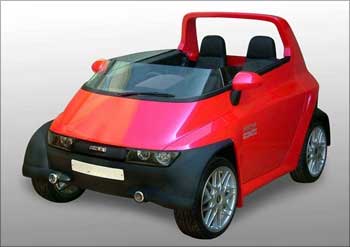
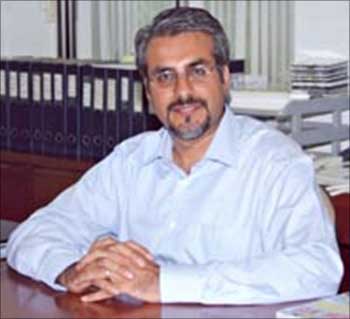
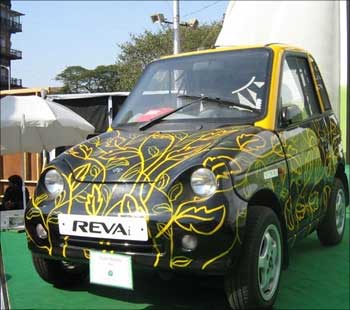
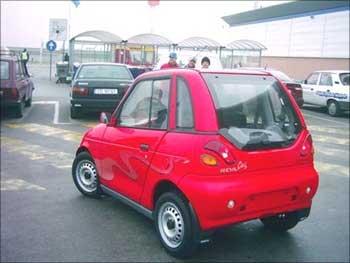
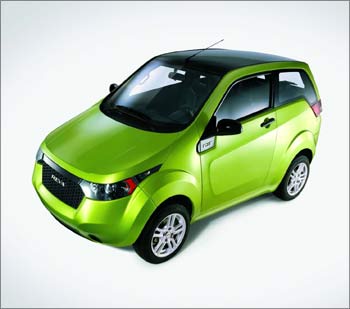
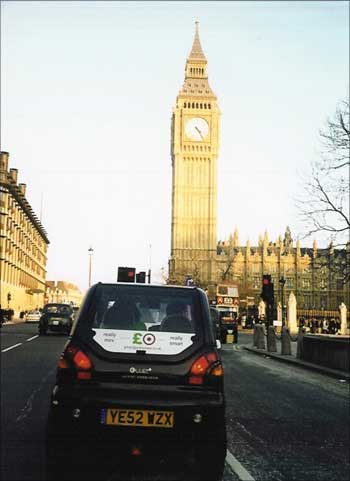

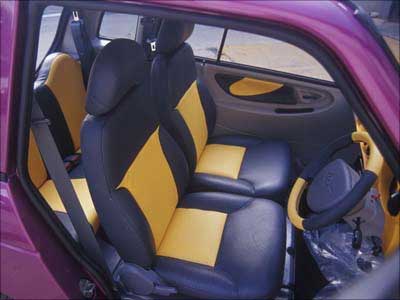
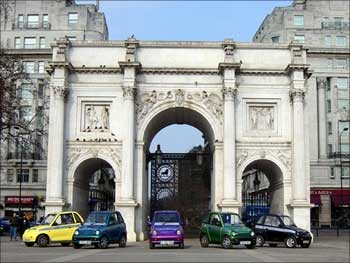
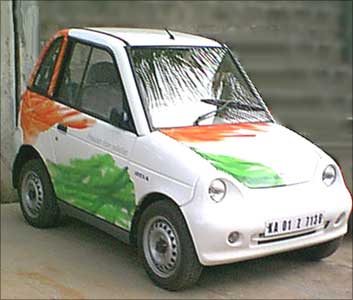
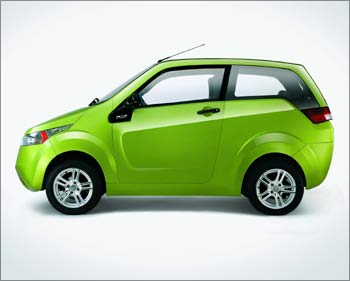

article